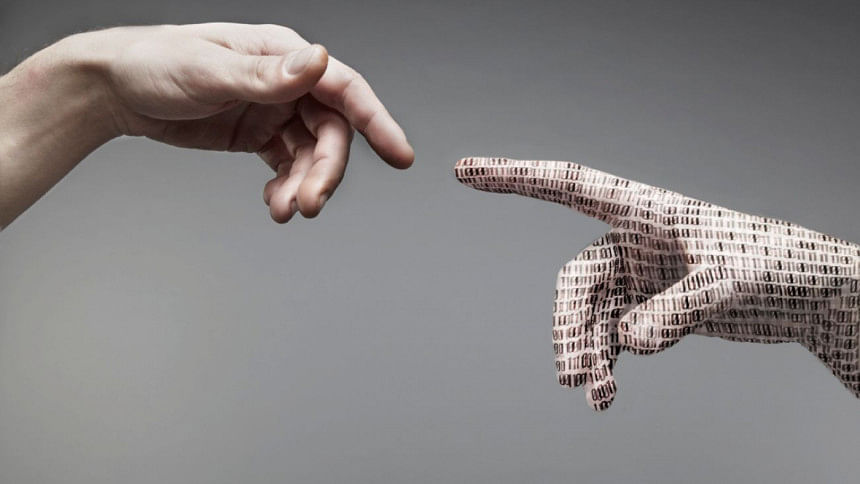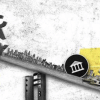When higher minds serve baser instincts

Human civilisation is a contradiction in terms, because humans may not always be "civilised" and the "civilised" may not always be humans. What we have hanging in the balance is an intermediate race full of pretensions. Humans pretend to be civilised and the civilised pretend to be human. While the rational is merely a front for the animal, virtue for vice, truth for lie, and humanity for cold-heartedness, civilisation is just a cover for the clever to exploit the credulous.
The hallmarks of this civilisation are knowledge, information, inventions and etiquettes, which process human beings cooked on the outside but raw on the inside. The concoction of speeches, attires, manners, cosmetics and eruditions create the aura. Behind it, individuals remain as eclipsed by their instincts as ever.
Thus, the civilisation is a critical balance that can be tipped by the slightest turmoil. Once the cradle of civilisation, Greece is clobbered by economic meltdown. Greek women are reportedly selling sex for the price of a sandwich, the going rate for a 30-minute session falling from 50 euros to as low as two euros. The pride of this civilisation is as delicate as a soap bubble.
French philosopher Jean Jacques Rousseau's fundamental assumption is that the corrupting influence of society is responsible for the misconduct of individuals. An irony is inherent to this seminal postulation when the rules are broken in the name of the game. Politicians usurp power to rule in the name of people. Banks swindle customers and then indulge in corporate social responsibility. Businessmen steal and then give in charity. Bribe takers go on pilgrimage with their dirty money.
On a macro scale, the Bollywood film industry is financed by the underworld. The mafia runs governments in Italy. War lords rule Afghanistan and Somalia. Drug cartels dominate life in Mexico and Colombia. Fundamentalists are dictating the terms of religion worldwide.
This concourse of contradictions isn't only confined to our daily existence, but pervades history. The wealthy and powerful have patronised art, culture, music and literature for centuries. The Medici family made money first as merchants and then as the de facto rulers and bankers of Florence. They bankrolled the cultural movement that dragged Europe out of the Dark Ages into modernity. The revival of learning, rationality and the arts patronised by them spread throughout Europe, and sped along by the invention of the printing press, these developments forever transformed the Western world. This one family made household names of da Vinci, Michelangelo and Galileo.
King Ferdinand and Queen Isabella of Spain sponsored the voyage of Christopher Columbus, who discovered the new world. Likewise, countless explorers, voyagers, musicians, writers, painters, scientists and scholars sought and enjoyed the support of noble or ecclesiastical patrons. The European culture moved away from its patronage system with the rise of bourgeois and capitalist social forms in the mid-19th century. The more publicly supported system of museums, theatres, mass audiences and mass consumption emerged, which continues till today.
Democracy came as a great relief for the creative minds as public funding rescued many of them from the indignity of currying favours with kings, queens, feudal lords and business magnates. Not that this practice has altogether disappeared. There are still many private pockets supporting philanthropic work. But the creative minds have more options now to pick favours on more favourable terms.
That explains why intellectuals and artists often rally behind governments like flies swarm over sweets, partly driven by fear and persecution. The patronage system still persists to a large extent. It's increasingly geared towards political leverage than creative indulgence, more so in underdeveloped than developed societies.
When unscrupulous politics and ill-gotten money take over, intellectual ability, creativity and originality live at the mercy of dubious benefactors. These benefactors set up universities, build mosques, fund charities, promote cultural events and bankroll ideas to promote their vested interests instead of common causes. Gifted minds work for them, submitting to the rigors of indentured labour.
Plato writes that the ability to hold two opposite ideas is a sign of the civilised mind. Most humans are incapable of doing it except for the hypocrites fashioning themselves as archetypes of cultural sensitivity. In that sense, what's human may not be civilised and what's civilised may not be human. Higher minds serving baser instincts, this civilisation is a ludicrous phenomenon comparable to keeping clean water in filthy buckets.
Thinkers, writers, actors, inventors, singers and musicians, the upholders of the finest human qualities, are seeking support and recognition from murderers, smugglers, swindlers, bank defaulters and land grabbers, who control economies. British historian Arnold Toynbee claims that civilisations arose when "creative minorities" devised solutions that reoriented their entire society. Buried in the deep pockets of wealthy patrons, those minorities are now paid to reorient themselves, devising solutions at the expense of their societies.
The writer is the Editor of weekly First News and an opinion writer for The Daily Star. Email: [email protected]

 For all latest news, follow The Daily Star's Google News channel.
For all latest news, follow The Daily Star's Google News channel. 








Comments